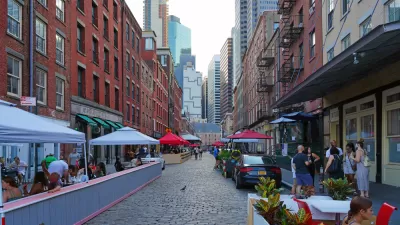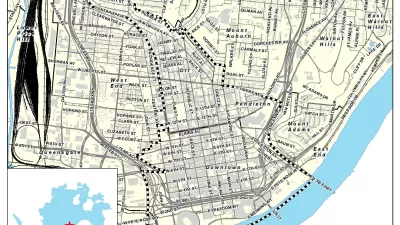A proposed Urban Parking Overlay District would end requirements for off-street dedicated parking in two of Cincinnati's busiest neighborhoods.

John Young writes on opinion piece offering support and advice for the Cincinnati City Planning Department as it prepares an Urban Parking Overlay District for the downtown and Over-the-Rhine neighborhoods.
"If approved, the district would remove the requirement for uses in downtown to provide off-street dedicated parking," according to Young, and Young is all for ending off-street parking requirements.
According to Young, the city has added thousands of parking spots in the last six years, leaving the downtown neighborhoods with an overabundance of parking. Instead of the status quo, Young encourages a Shoupista-approved approach to parking innovations, and new kinds of infill development that could be attracted to a parking requirement-free development market.
"Even when parking requirements are reduced or eliminated most banks and investors still require parking to be provided or identified for developments to move forward," explains Young to make a key point. "Removing zoning requirements for parking often allows the developer to build the parking that is really needed and not what is arbitrarily demanded by local zoning controls. This reduces the cost of development and in turn, allows more affordable housing to be provided."
Young includes more details about what a post-parking requirement approach to parking might look like in Cincinnati, as well as the kinds of benefits the city could shoot to achieve in implementing parking reform.
FULL STORY: EDITORIAL: Parking Requirement Removal Should Be First Step In Broader Reform

Alabama: Trump Terminates Settlements for Black Communities Harmed By Raw Sewage
Trump deemed the landmark civil rights agreement “illegal DEI and environmental justice policy.”

Study: Maui’s Plan to Convert Vacation Rentals to Long-Term Housing Could Cause Nearly $1 Billion Economic Loss
The plan would reduce visitor accommodation by 25% resulting in 1,900 jobs lost.

Planetizen Federal Action Tracker
A weekly monitor of how Trump’s orders and actions are impacting planners and planning in America.

Waymo Gets Permission to Map SF’s Market Street
If allowed to operate on the traffic-restricted street, Waymo’s autonomous taxis would have a leg up over ride-hailing competitors — and counter the city’s efforts to grow bike and pedestrian on the thoroughfare.

Parklet Symposium Highlights the Success of Shared Spaces
Parklets got a boost during the Covid-19 pandemic, when the concept was translated to outdoor dining programs that offered restaurants a lifeline during the shutdown.

Federal Homelessness Agency Places Entire Staff on Leave
The U.S. Interagency Council on Homelessness is the only federal agency dedicated to preventing and ending homelessness.
Urban Design for Planners 1: Software Tools
This six-course series explores essential urban design concepts using open source software and equips planners with the tools they need to participate fully in the urban design process.
Planning for Universal Design
Learn the tools for implementing Universal Design in planning regulations.
Caltrans
Smith Gee Studio
Institute for Housing and Urban Development Studies (IHS)
City of Grandview
Harvard GSD Executive Education
Toledo-Lucas County Plan Commissions
Salt Lake City
NYU Wagner Graduate School of Public Service





























